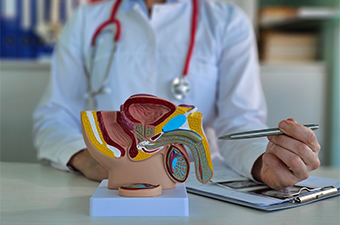Prostate cancer is the most common type of cancer in men. It is cancer that occurs as a result of uncontrolled and abnormal growth of cells in the prostate gland. Symptoms of this disorder, which usually does not cause any symptoms in the early stages, include pain and burning during urination, difficulty in urinating, slow and weak urine flow, presence of blood in the urine, frequent urge to urinate, urinary incontinence, pain during ejaculation and blood in the semen, pain in the lower pelvic area, erectile dysfunction, weight loss, fatigue, pain in the hips, back, chest and bones, nausea and vomiting are the main precursors of the prostrate cancer. Early diagnosis of prostate cancer, which ranks second in cancer-related deaths, is important for its treatment. The diagnostic stages are PSA Blood Test, Prostate Examination, Multiparametric Magnetic Resonance Imaging, Prostate Biopsy and Ultrasound Fusion Biopsy. The most important treatment for early diagnosed prostate cancer is Robotic Surgery.
Robotic Surgery, which exists with the developing surgical methods today, is less invasive, has smaller incisions and has a lower risk of complications than other surgical methods. Robotic surgery consists of three parts: the part with the operating arms, the part with the electronic and display systems, and the console where the surgeon manages the arms. With the help of the console, the movements made by the surgeon on the console are transferred to the operating field and the use of electronic sections is enabled. With the presence of small robotic arms that are more flexible than the wrist, operations can be performed more easily in small areas. In robotic surgery, the area to be operated on is shown 12 times larger and three-dimensional. In this way, tissues appear in more detail, cancerous tissues are removed more safely, and the risk of complications is minimized. This high-level of precision made available by robotic surgery is the reason why it is mainly preferred fort he surgical modality of the prostate cancer. For Robotic Prostate cancer surgery, 4 incisions ranging from 8 millimeters to 12 millimeters are made in the patient’s belly area. Thanks to the highly enlarged surgical area, the cancerous area is operated on very comfortably, minimizing the possibility of cancerous tissue being left behind.
Turkey is among the top countries in the field of urology and high-tech urological surgical interventions. Having an established medical background in the field, thanks to rigorously trained medical practioners, well-equipped modern hospitals and clinics, is the main reasons why Turkey is poised to become a leading country in urology Prostate cancer treatment and surgeries are performed by our well-experienced urologist at select hospitals in Izmir and Istanbul, where robotic prostrate surgeries are successfully perfomed with a high success rate. In comparison to those of the private hospitals in Europe and United State or Gulf States, prices not only remain significantly reasonable, but at the same time affordable Fast-forwarding, efficient pre- treatment diagnostic assesment, well-curated bespoke treatment plans, accompanied by a seamless post-treatment after- care faciities are the trademark qualities of Prospero Medical. Like in all the non-elective treatments we curate, we are committed to be the leading prostate cancer treatment facilitator in Turkey.





